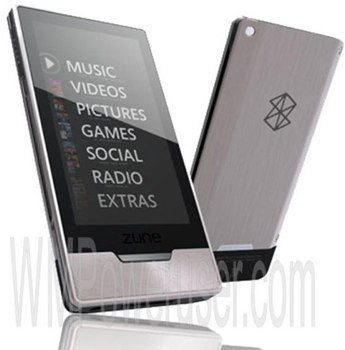 Like a dazed fighter who just nodded “Yes, I’m OK,” to a referee, Microsoft stumbled back into the center of the MP3-player ring: With the Zune HD and Xbox 360 integration as its weapons, the company started slugging. Its primary opponent, Apple, isn’t necessarily going toe to toe with Microsoft, but no doubt Apple is just as startled as I am that Microsoft is still in the fight.
Like a dazed fighter who just nodded “Yes, I’m OK,” to a referee, Microsoft stumbled back into the center of the MP3-player ring: With the Zune HD and Xbox 360 integration as its weapons, the company started slugging. Its primary opponent, Apple, isn’t necessarily going toe to toe with Microsoft, but no doubt Apple is just as startled as I am that Microsoft is still in the fight.
We should make note that this isn’t a full list of specs either, but rather what Microsoft was willing to let out for the moment. Take a look:
- 3.6 inchish OLED full touch screen
- NVIDIA Tegra powered
- 4GB, 8GB, 16GB, 32GB, and 120GB versions
- HDMI Connection to stream straight to your TV
- HD Radio
- Web Browser
- WiFi compatible, with wireless marketplace
- Released early fall
- International release of the Zune device itself
- Home AV packs, Car packs, Charge packs
We are working on getting independent confirmation of what we see above, and we will let you know when that happens.
As a ring-side spectator, I can only pull off my press hat, rub my head, and wonder how I got this one so wrong. Late last year, I predicted the demise of Microsoft’s marginal Zune player. With the surprise introduction of the Zune HD, I’ve been proven very wrong. But this iPod-like device isn’t even the biggest news. Microsoft’s savvy uppercut punch is the deep integration of the Zune Marketplace and brand into one of its most successful brands: Xbox Live.
Whenever we talk about the success of the iPod, the discussion inevitably turns to the power of the iTunes ecosystem. Without that platform, the iPod would never have become the cultural phenomenon it is today; Apple’s control over hardware, software, music selection, quality, and prices, and its subsequent rollout of the remarkable App Store, have made the iPod (and iPhone) an unstoppable market force.
The one area where Apple hasn’t had huge success, though, is in the living room. Sure, there are countless iPod docks that let you play music all over the house, but transferring your iTunes content from your Mac or PC to your TV, for instance, is another matter. Apple’s main entry in this space has been the Apple TV, a product that looks just like the Mac Mini but accomplishes far less. I know people who own Apple TVs—the reviews have not been glowing, and Apple is many miles from being dominant in this space.
Microsoft, on the other hand, spent years trying to convince consumers that they needed PCs in their living rooms. When that failed, the company turned to media extenders, an intriguing concept: thin, wide boxes that could deliver, via a wired or wireless network, Windows PC content to living-room TVs and stereos. Again, consumers ignored these products.
Then, as now, Microsoft finally stopped trying to swim upstream and made what I still consider one of its most brilliant moves: It turned the Xbox 360 into a media extender. The company realized that it would sell millions of these gaming consoles, which happened to have built-in networking capabilities. So why not add a few other brand-extending features?
Since then, millions of Xbox owners have used their gaming consoles not only to play video games against opponents around the world but also to view local content and even stream movies from Netflix and Starz. Obviously, Microsoft sees a similar opportunity with the Zune brand. Instead of trying to drive consumers to buy Zune hardware and start using the Zune Marketplace online, Microsoft will present the Zune brand as a premier option on one of its most popular and active platforms.
Microsoft makes its strategy crystal clear in its press release: “Zune will occupy the first slot within the Xbox user interface in the Xbox LIVE Video Marketplace, exposing the Zune brand experience to millions of new consumers for the first time.” Starting this fall, anyone who visits the Xbox Live Marketplace will see Zune and its collection of movies (it’s unclear if they’ll be in HD). This is the equivalent of a rabbit punch to Apple’s jaw. Microsoft will seed the market with new users by turning them on to the possibilities of the Zune brand. The strategy is so critical to Zune’s success that Microsoft’s press release leads with the news. The mention of the Zune HD and its attributes is almost (but not quite) an afterthought.
In fact, this plan can’t work without killer hardware. And from the looks of things, Microsoft is following that rabbit punch with a swift right to the jaw, in the form of the Zune HD. The photos we’ve seen show a thin, sharp, and—most important—sexy device. Microsoft even adds a surprise: HD radio. Apple won’t go near a radio tuner of any kind. Microsoft is jumping in with both feet and embracing a format that many aren’t even sure will survive. I like its moxie. I’m not going to go out on a limb and predict victory for Microsoft or Apple in this latest battle, but one thing is clear: Microsoft is ready to go at least a few more rounds.
loading...
loading...
